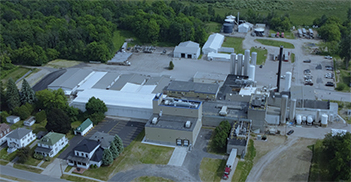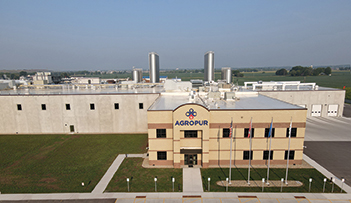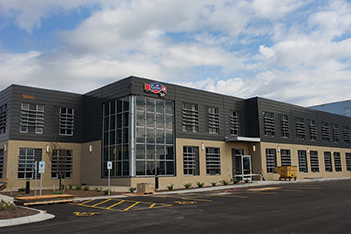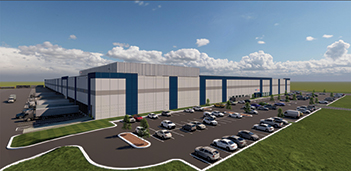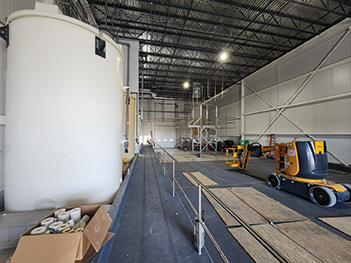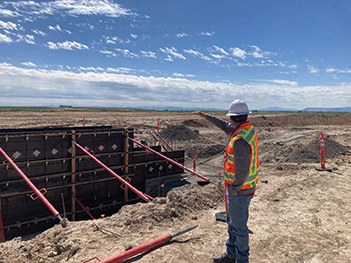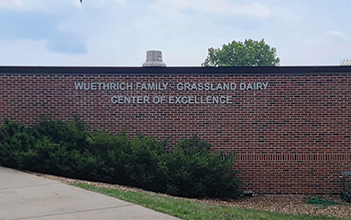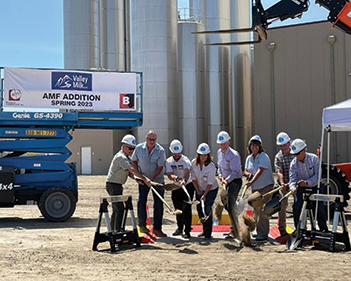 |
|||

|
 |

|
|

Dairy industry growth abounds with investments, expansions
Editor’s note: Plants in Progress is a special segment spotlighting new facilities and expansion in the U.S. dairy sector. As the industry works to meet new demand, growth and expansion are inevitable. Here, we provide a glimpse into new cheese and dairy plants and expansions across the country — from initial groundbreaking to full operation, and everything in between.
By Alyssa Mitchell
MADISON, Wis. — In the midst of political shakeups, global conflicts and volatile markets, the U.S. dairy industry continues to thrive as companies invest in new technologies and equipment, capacity expansions and production of value-added products.
In our latest installment of Plants in Progress, you’ll read about companies from coast to coast that are investing in their facilities, employees and communities by adding space, increasing efficiencies, utilizing climate-smart technologies, growing the local workforce and revamping production lines to produce specialized cheeses, dairy powders and other high-value products.
Industry stakeholders and local and state governments are helping to make these visions a reality with personal donations, grants, tax incentives and other fundraising endeavors. Old, dormant facilities are being given new life and purpose through capital improvements, while existing plants are being repurposed for maximum efficiency and throughput as the U.S. dairy sector strives to keep pace with growing consumer demand both domestically and overseas.
The industry also is investing in the next generation with revamped research and teaching facilities from Idaho to Wisconsin, while ingredient manufacturers and consumer packaged goods companies are making upgrades and expanding capacity to improve supply chains.
Please read on for more on these Plants in Progress ...
|
| Photo courtesy of the Office of the Governor of New York |
| UP AND RUNNING — Agri-Mark Inc. completed a $30 million expansion and modernization project this summer at its cheese manufacturing facility in Chateaugay, New York. The multi-phase, 9,600-square-foot expansion includes a state-of-the-art cheese production room for improved efficiency. |
•Agri-Mark Inc., Chateaugay, New York, and Hardwick, Vermont
New York Gov. Kathy Hochul this summer announced the completion of Agri-Mark’s nearly $30 million expansion and modernization project at its cheese manufacturing facility in Chateaugay, New York. The expansion, which was a multi-phase project, is retaining more than 100 full-time jobs, supporting more than 500 agricultural jobs in the region and helping to boost the state’s dairy industry in Northern New York. Agri-Mark’s North Country facility produces award-winning Cabot and McCadam cheese products.
A ribbon-cutting in June marked the completion of the 9,600-square-foot expansion. The most recent addition was a state-of-the-art cheese production room, which has improved the facility’s efficiency. The expansion project also included the rebuilding of the 110,000-square-foot manufacturing center, reconfiguring the layout of the facility, and purchasing new equipment and machinery.
“This is a special day for Agri-Mark, our plant and its employees, and especially for our 174 dairy farm families in the North Country,” said Agri-Mark CEO David Lynn at this summer’s ribbon-cutting event.
“This modernization project solidifies our long-term presence in Chateaugay. It ensures that we’ll have a sustainable facility that can process the milk our farmers produce, provide a safe, modern workplace for our employees, and continue to produce the award-winning cheeses our customers and consumers have to come to expect from our McCadam and Cabot brands.”
Empire State Development supported the dairy processing facility’s expansion with $6 million in funding, including $4 million in Economic Transformation Program funds.
Also this summer, Agri-Mark’s Cabot Creamery Cooperative announced it is turning the historic Yellow Barn in Hardwick, Vermont, into its new visitor’s center. The barn was built in the 1800s and most recently served as local business Greensboro Garage until 2017. The building then was bought by the town of Hardwick and has been empty since.
In August, Evernoth Rural Ventures and Massachusetts Housing Investment Corp. announced an $11.4 million New Markets Tax Credit allocation for the redevelopment of the barn. The funding supports construction of a new 25,137-square-foot food business accelerator and the adaptive reuse of the vacant, historic 4,762-square-foot yellow dairy barn for use as a retail shop, collectively called the Yellow Barn Business Accelerator.
Anchor tenants in the new food business accelerator will be the Hardwick-based nonprofit Center for an Agricultural Economy and Greensboro, Vermont-based Cellars at Jasper Hill.
Once renovated, the historic barn will become a retail destination operated by Cabot Creamery.
|
| Photo courtesy of Agropur |
| TWICE THE VOLUME — Agropur’s new 225,000-square-foot manufacturing plant in Little Chute, Wisconsin, began production this spring. The state-of-the-art facility more than doubled the milk processing volume of the facility it replaced. |
• Agropur, Little Chute, Wisconsin
Agropur’s new 225,000-square-foot manufacturing plant in Little Chute, Wisconsin, began production this spring after more than a year of construction. The $168 million, state-of-the-art facility added 50 new jobs to the region and more than doubled the milk processing volume of the facility it replaced.
Agropur’s Little Chute facility produces individually quick frozen (IQF) Mozzarella sticks for worldwide foodservice and consumer packaged goods retail channels. The plant is the top manufacturer of IQF cheese sticks in the United States. It receives 3.3 million pounds of milk every day from 70 local milk producers, which is used to create Mozzarella that is then extruded, cut, packaged and frozen.
Agropur’s customers can choose from a variety of options including different shapes and sizes.
The new plant was Agropur’s second-largest investment in a U.S. facility after the expansion of its Lake Norden, South Dakota, plant in 2018. It replaced Agropur’s prior 52,000-square-foot Little Chute plant located just south of the current site.
The Little Chute plant also reflects Agropur’s focus on sustainable production. It includes a cutting-edge, wastewater treatment facility designed with the ability to generate renewable energy using biogas from the anaerobic digestion process. Electricity created at the facility is used on site. It is anticipated the plant will reduce greenhouse gas emissions each year by an amount comparable to taking 1,200 cars off the road.
• Artisanal Caves LLC, Utica, New York
Artisanal Caves LLC, the operating unit of Artisanal Brands and owner of the Artisanal Premium Cheese brand, has announced plans to expand as well as return to being a publicly traded company.
Artisanal’s cheese fulfillment center and bakery in central New York soon will undergo a significant overhaul of the 18,000-square-foot facility to build the Cheese Cave and the Wine Cellar & Barrel Room.
The Cheese Cave will offer an extensive variety of domestic and international artisan cheeses aged to peak ripeness. Adjacent will be a place to enjoy a cheese-centric menu. The bakery will be upgraded with seating, along with a Cookie Bar, drive-up window and a wider offering of products.
The company announced its central New York location is the first of several regional shipping hubs that Artisanal intends to open to substantially reduce the distance and shipping costs of online orders from www.artisanalcheese.com.
Artisanal Executive Chairman Daniel Dowe says the new Artisanal Cave format will be the inverse of the once-popular Manhattan restaurant, the Artisanal Fromagerie & Bistro, which had a small cheese cave and a large eatery. The next chapter for Artisanal will be a large walk-in cheese aging area in cave-like conditions with precise temperature and humidity controls. Visitors will be able to explore and learn more about cheese and pairings along with their culinary experiences.
“We didn’t want to just build small cheese shops. Our customers love to learn about what we do, and there is no better way than for them to be among the cheeses aging and to take it all in. This next chapter will be the most exciting phase for Artisanal, and we can’t wait to get started,” Dowe says.
|
| Photo courtesy of Bongards Creameries |
| SHINY AND NEW— Bongards Creameries recently began utilizing new cheese vats at its plant in Perham, Minnesota, as part of a $125 million expansion project currently underway. Upon completion, the plant will be able to process milk into a total of 588,000 pounds of cheese per day. |
• Bongards Creameries, Perham, Minnesota
Bongards Creameries in September began an expansion project announced earlier this year at its plant in Perham, Minnesota.
The expansion/modernization of the Perham plant will consist of a new 70,000-square-foot cheese cooler, new cheese vats — which started up earlier this month — a new whey pasteurizer that came online in August, a new permeate evaporator (to start up in January 2024), a new milk intake (to be complete July 2024) and a new deproteinized whey dryer/permeate packaging system/permeate warehouse, which will be completed in early 2025. Additionally, all of the equipment that is not being replaced will be expanded by 30% to handle the additional volume the company will be running through the plant once the project is complete.
Total area of the upgrades mentioned above is approximately 150,000 square feet, which will more than double the facility’s capacity, says Daryl Larson, president and CEO of Bongards Creameries. Total project cost is estimated at $125 million.
“With this latest investment, we will be able to continue supporting the growth of our business, allow our current farmer-owners to expand and allow us to bring on new members,” Larson says.
Bongards’ Perham plant produces barrel Cheddar for use in its processed cheese plants as well as 40-pound block Cheddar, Monterey Jack and Colby Jack. The whey is fractionated to produce whey protein isolate and whey protein concentrate 80% as well as dried deproteinized whey.
Larson notes the company plans to add 22 full-time positions once the project is complete.
“We originally expanded this plant in 2014/2015 to more than double its capacity to 4.2 million pounds from 1.7 million pounds per day,” he says. “Our members quickly filled up that capacity, and we have been full since shortly after that expansion. Many of our members have a desire to grow, and in order to facilitate that and continue to become more efficient, the decision was made to expand again.”
Once complete, the Perham facility will process 5.5 million pounds of milk per day, 588,000 pounds of cheese per day and 350,000 pounds of dried whey products per day.
|
| Photo courtesy of Cheese Merchants |
| ADDING VALUE — Dairy State Cheese is undergoing an equipment upgrade to add capacity to manufacture 40-pound block Parmesan. “Parmesan is at the core of what we do,” says Barry Gurewitz, vice president of marketing for Cheese Merchants, which acquired Dairy State earlier this year. |
• Dairy State Cheese LLC, Rudolph, Wisconsin
Dairy State Cheese currently is undergoing a project to convert manufacturing to 40-pound block Parmesan. The company, which is owned by Cheese Merchants, recently finished installing a penthouse for the new 40-pound block formers, a key component of Cheese Merchants’ vertical integration strategy to control milk flow through production to aging to finished goods.
“Parmesan is at the core of what we do,” says Barry Gurewitz, vice president of marketing for Cheese Merchants, which acquired Dairy State Cheese in Rudolph, Wisconsin, earlier this year.
“This is a significant shift for Dairy State as we shift from producing 640-pound Cheddar to 40-pound Parmesan blocks,” adds Mark Dahlstrom, president of Dairy State Cheese.
He notes the first phase of the project includes the penthouse that is built for eight 40-pound block towers, four of which will come online in the first phase.
“We’ll also be able to run American styles in the 40-pound block towers — that will be complete by the end of the year, commissioning to begin in the last week of this year,” Dahlstrom says.
He adds rather than increase the size of the facility, the project is upgrading the equipment, resulting in increased efficiencies. Dairy State also expanded its employee entrance area and added new amenities.
Phase two of the project will commission in early 2025, when Dairy State plans to install eight new vats, four additional towers and two additional salt belts.
“That equipment is sized to allow us to double plant capacity, but without adding new walls,” Dahlstrom says.
Upon completion, which is slated for the second quarter of 2025, the plant will be able to process 3 million pounds of milk each day into cheese production. Finished product production will vary by cheese type.
“What this means for our farmers is that their milk is going to be converted into a higher-value cheese product instead of just commodity Cheddar,” Dahlstrom says.
Company officials also are quick to note that Dairy State’s popular retail store, including the sale of cheese curds, will remain as part of the project.
• Danone North America, Jacksonville, Florida
Danone North America earlier this year announced it will invest up to $65 million over the next two years to create a new bottle production line in Jacksonville, Florida. The investment will support Danone North America’s long-term growth strategy and will deliver key benefits across the U.S. business, including advancing operational excellence, enabling flexibility in bottle design, accelerating the company’s sustainability goals and driving cost efficiencies.
The $65 million investment will increase production of several of Danone’s coffee and creamer brands in the United States, including International Delight, Silk and SToK. It also serves to meet consumer demand in these categories while supporting the company’s sustainability goal by reducing overall water consumption, decreasing carbon emissions and accelerating the company’s goal of packaging circularity.
Construction has commenced on the expansion, which will create up to 40 new full-time jobs with competitive wages and benefits. New employees will be eligible for Danone North America’s parental bonding leave policy, enabling all manufacturing employees with one year of tenure to take up to 18 weeks of paid time off after the birth or adoption of a child.
• Darigold Inc., Pasco, Washington
Darigold Inc. last year broke ground on a new production facility in Pasco, Washington. When fully operational, the $600 million facility will process approximately 8 million pounds of milk per day from more than 100 dairy farms in surrounding communities. Darigold expects the facility to be operational by early 2024 and plans to hire about 200 employees.
Chris Arnold, vice president and head of communication for Darigold, says more than 1,300 foundational pilings have been driven into the ground, more than 9,000 yards of concrete for foundations and cast-in-place panels have been poured, one dryer building has been erected, the milk receiving structure has been built, and one dryer chamber has been built on site with another one in the works.
When fully operational, the facility will have the capacity to produce approximately 175 million pounds of butter and nearly 280 million pounds of powdered milk annually.
|
| Photo courtesy of Emmi Roth |
| CONVERSION CAPABILITIES — Emmi Roth’s new 134,000-square-foot headquarters and cheese conversion facility in Stoughton, Wisconsin, is nearing completion. The new facility is set to begin operations this fall. |
• Emmi Roth USA, Stoughton, Wisconsin
Emmi Roth’s new 134,000-square-foot headquarters and cheese conversion facility in Stoughton, Wisconsin, is nearing completion. The new facility, set to begin operations this fall, will add conversion capabilities so Emmi Roth can better serve its customers. It also will allow Emmi Roth to provide more flexible packaging options to customers, which may be a cup, bag, chunk, wedge or other forms. The new facility also will increase distribution capacity.
The Stoughton location will add to existing Emmi Roth locations in Monroe, Platteville and Seymour, Wisconsin.
The project team recently achieved partial occupancy for Phase 1 of the project, and the conversion facility is buzzing with excitement as new Emmi Roth employees settle in to the new space, company officials say.
Work still is ongoing on Phase 2 of the project, which includes completion of office space for Emmi Roth’s new corporate headquarters. This portion of the project is expected to be complete in early 2024.
• Fairlife LLC, Webster, New York
The Coca‑Cola Co. this spring announced it has selected Webster, New York, as its preferred location for a new fairlife production facility as part of the brand’s continued expansion in the Northeast market.
The new approximately 100-acre facility will be located in the Town of Webster, just outside of Rochester, New York, and is expected to source from local milk cooperatives to produce fairlife’s high-quality, dairy-based beverages before distributing them to retailers across the region.
“Consumer demand for fairlife products is at an all-time high, and a new production facility will allow us to significantly increase capacity and deliver fairlife to even more households across the country,” says fairlife CEO Tim Doelman. “As we continue to grow in the Northeast, Webster’s proximity and access to best-in-class dairy farmers make it an excellent location to support our next phase of growth in the region and beyond.”
Groundbreaking and construction on the new facility is expected to commence by the end of the year following due diligence and appropriate approvals, company officials say. The facility is anticipated to be operational beginning in the fourth quarter of 2025.
|
| Photo courtesy of Great Lakes Cheese Co. |
| EXPANDED CAPACITY — Great Lakes Cheese’s new facility in Franklinville, New York, is on track to start packaging operations in 2024 and will be fully operational in 2025. The new plant is replacing the company’s existing facility in Cuba, New York, upon completion. |
• Great Lakes Cheese Co., Franklinville, New York
Great Lakes Cheese Co. is building a new cheese manufacturing and packaging plant in Franklinville, New York. With a capital investment of more than $600 million, the project is the largest infrastructure investment in the company’s history and will nearly double the size of its current workforce in the Southern Tier of New York.
The new plant will replace the existing facility in Cuba, New York, upon completion. Although the Cuba facility is planned to cease operations, the company still is evaluating possible future uses for the site, company officials say.
The Franklinville project is on track to start packaging operations in early 2024, and it will be fully operational in 2025, company officials say.
• Hilmar Cheese Co., Dodge City, Kansas
Hilmar Cheese Co. is building a new state-of-the-art cheese and whey protein processing plant in Dodge City, Kansas. The new facility is expected to create 250 new jobs and represents more than $600 million in capital investment.
Construction moves toward a 2024 opening, company officials say. The roof now covers most of the building, and HVAC and duct work continues. Contractors are working on the plumbing and piping throughout the facility. The structural steel in the administration area is complete. Lighting is being installed in various areas. Framing and drywall are the focus for the maintenance shop.
A significant milestone was reached in September, when the first piece of processing equipment arrived and was placed.
Hilmar also has a temporary administrative and hiring office at 2308 1st Ave. in Dodge City, allowing a location for interviews and business activities while construction continues. Hilmar has filled many leadership positions and continues hiring for a variety of roles. More information about open positions can be found at hilmar.com/careers.
• HP Hood, Batavia, New York
A proposal reviewed by the Genesee County Economic Development Center at its Sept. 7 board meeting for HP Hood’s $120 million expansion marks a significant milestone for the project taking place at the Genesee Valley Agri-Business Park in the town of Batavia, New York.
Since opening in 2011, the Ag Park and supporting infrastructure has generated investments of approximately $607 million by HP Hood, Upstate Niagara Cooperative, Marktec Products and O-AT-KA Milk Products that have resulted in a cluster with more than 1.2 million square feet of food and beverage facilities set to employ more than 1,000 professionals in the food processing industry, which is the leading employment sector in Genesee County and the GLOW region, officials say.
Empire State Development recently announced HP Hood’s plan to grow its operations in the Genesee Valley Agri-Business Park. The project will include the addition of new processing systems, along with other upgrades that will allow the company to increase capacity for the production of additional extended-shelf-life beverages at the Batavia facility. As a result, the company has committed to creating up to 48 new jobs at the manufacturing facility. To date, the company has created more than 400 jobs at the site and currently employs close to 1,200 statewide. HP Hood purchased the on-site, 363,000-square-foot plant in 2018 from Dairy Farmers of America for $60 million and soon after expanded the facility by another 100,000 square feet. HP Hood is the business park’s largest landowner.
• IFF, New Century, Kansas
IFF this summer announced the completion of its new North American Creation and Design Center in New Century, Kansas. The IFF Creative Center brings together the company’s flavor and ingredient expertise with its food design capabilities to better support the growth of the region’s food industry.
The infrastructure upgrade includes the addition of two new flavor creation labs, the expansion of existing food application design labs for dairy, bars, culinary and bakery, and a new lab solely for pet food development. The facility is now the company’s second-largest creative center in North America and houses 10 labs and six state-of-the-art pilot plants, which serve two purposes: providing better customer support and enhancing innovative product development.
“Our capability expansion in New Century provides a significant advantage to our customers,” says Carmen Cain, regional president for IFF’s Nourish division. “By integrating flavors, ingredients and food design in one space, we can increase our speed-to-market while offering a breadth of knowledge and resources across multiple food categories.”
The two new flavor creation labs — one for sweet and one for savory flavors — mark the first time flavorists will be based at the New Century facility. The expert flavorists will develop alongside the dairy, bakery, bars, culinary and pet food product application and design teams.
|
| Rendering courtesy of Kraft Heinz Co. |
| ACCESS AND EFFICIENCY — Kraft Heinz Co. is building one of the largest automated consumer packaged goods distribution centers in DeKalb, Illinois. The 775,000-square-foot national distribution facility will feature state-of-the-art automation technology and national railway access. |
• Kraft Heinz Co., DeKalb, Illinois
The Kraft Heinz Co. this summer announced a more than $400 million investment to build one of the largest automated consumer packaged goods distribution centers in North America. Located in DeKalb, Illinois, the 775,000-square-foot national distribution facility will feature state-of-the-art automation technology and national railway access, enabling Kraft Heinz to drive greater supply chain efficiencies and distribute its products to retail and foodservice customers faster than ever. The facility is expected to bring more than 150 jobs to the region.
“The DeKalb distribution center is expected to play a critical role in our larger distribution strategy, moving more than 60% of Kraft Heinz dry goods in North America through our automated facilities,” says Erin Mitchell, vice president of logistics and head of network restructuring at Kraft Heinz. “It’s a testament to the dynamic, out-of-the-box thinking of our supply chain teams whose work enables us to operate with greater efficiency and agility every day.”
The facility’s design includes a 24/7 automated storage and retrieval system with the ability to drive twice the volume for Kraft Heinz customers. It also is expected to contribute to Kraft Heinz’s ability to achieve its broader ESG ambitions to reduce its operational environmental footprint through the implementation of sustainable technology and solutions to reduce the waste produced at the facility and minimize its overall environmental impact.
Kraft Heinz has partnered with Trammell Crow Co., a global commercial real estate developer; Krusinski Construction Co. as general contractor; Daifuku as integrated logistics automation provider; and the city of DeKalb and the DeKalb County Economic Development Corp. on the development of the facility.
• MDS Foods Inc., Tullahoma, Tennessee
Tennessee Gov. Bill Lee, Department of Economic and Community Development Commissioner Stuart McWhorter and MDS Foods Inc. (MDS Cheese) officials earlier this year announced the company will invest $8.9 million to expand operations at its Tullahoma, Tennessee, facility in the Coffee County Joint Industrial Park, a Select Tennessee Certified Site.
MDS Cheese will create 75 new jobs in Coffee County as a result of the project.
To increase its manufacturing and distribution capabilities, MDS Cheese will add roughly 48,000 square feet of cooler space dedicated to the distribution of finished products and approximately 10,000 square feet of space for new cheese production lines.
Founded and headquartered in Navarre, Ohio, MDS Foods Inc. has served supermarket delis and restaurants across the United States as a manufacturer and supplier of premium cheese slices, shreds, chunks, cubes and loaves for nearly 20 years. With the additional 75 new jobs in Tullahoma, MDS Cheese will employ nearly 200 Tennesseans.
“After 15 years of being in Coffee County, we are excited to continue growing by expanding our team and business here in Tullahoma. The cities of Tullahoma and Manchester, along with the Coffee County Industrial Board, have been great partners and made this expansion possible for us and our dedicated team members. We look forward to the next chapter of growth in Coffee County,” says Jim Straughn, president, MDS Foods Inc.
• Milk Specialties Global, Jerome, Idaho
Milk Specialties Global (MSG) this summer announced the completion of its new production facility in Jerome, Idaho, that will produce acid casein and rennet casein products for food and industrial applications.
MSG’s new facility will process 2.5 million pounds of milk per day and offer North American customers an alternative supply of domestically produced casein products.
“Our customers asked, and we listened,” says David Lenzmeier, CEO of MSG. “We have the knowledge and the network to create more value out of the high-quality milk produced in Idaho, so it just makes sense for us. We’re looking forward to getting to work with Magic Valley Quality Milk and our customers.”
MSG will work in tandem with Magic Valley Quality Milk (MVQM), a raw milk cooperative that will supply skim milk for casein production. MSG’s state-of-the-art Jerome facility is built adjacent to MVQM’s milk processing facility. The two facilities are connected by a pipeline to send milk between facilities, greatly reducing carbon emissions over the long term by eliminating the need for truck transportation.
“This is an exciting opportunity for our patron farmers,” says MVQM CEO Alan Stutzman. “Our farmers produce some of the best milk in the world, and Milk Specialties is an ideal partner to convert that milk into value-added ingredients.”
|
| Photo courtesy of Nelson-Jameson |
| DISTRIBUTION CENTER — Progress continues on Nelson-Jameson’s new state-of-the-art distribution center in Jerome, Idaho. The 45,000-square-foot building is tentatively scheduled for completion by the end of the year. |
• Nelson-Jameson, Jerome, Idaho
Nelson-Jameson last fall held a groundbreaking ceremony to kick off the building of its new distribution facility in Jerome, Idaho. The state-of-the-art facility will be the company’s most technologically advanced distribution center to date and will include approximately 1.5 million cubic feet of combined storage, office space, refrigerated and frozen storage areas, along with a service and maintenance area.
Progress continues, including the erection of walls, the roof and office infrastructure, company officials say.
Once complete, the facility will include 16 workstations, offices on the first and second floors — with room for additional growth — more than 3,700 pallet positions, full hazardous containment and, instead of shelving, roller deck feeds along with containers to move products into the distribution center.
The new distribution center also has been designed to include the latest architectural energy savings tactics, including insulated concrete tilt wall panels, all LED lighting, occupancy sensors for all lighting, high-efficiency HVAC systems, electronically controlled warehouse ventilation and use of high-efficiency warehouse storage systems.
The 45,000-square-foot building is tentatively scheduled for completion at the end of this year. The warehouse is expected to be up and running by Dec. 1, and all office personnel should be able to move in by the start of 2024, company officials say.
• Prairie Farms Dairy Inc., Luana, Iowa
Prairie Farms Dairy’s cheese plant in Luana, Iowa, last year broke ground on an expansion project that will provide added production, conversion and storage capacity to meet customers’ needs.
The Luana expansion project was largely complete this summer. Darin Copeland, public relations manager for Prairie Farms Dairy, notes that the new cooler at Luana was commissioned in September, and the new cutline and crates will be commissioned in December.
• Redhead Creamery, Brooten, Minnesota
Redhead Creamery recently received a USDA Rural Development Loan, provided through Stearns Electric, and a USDA Rural Development Value Added Producer Grant, which will be used for a major expansion that will double the footprint of cheese and cooler space, add a milk sugar (whey)-based distillery and increase the size of the creamery’s restaurant and seating area.
Upon completion, Redhead Creamery will have 6,000 square feet of production space, 5,000 square feet of retail space and a kitchen area. The expansion is expected to be complete in December.
The grant will be used to help the company test and expand its Redhead Creamery Spirits marketing. The farm also recently added robotic equipment to enhance the care of its cattle, including robotic milking, feed freshening and manure handling equipment.
The creation of whey-based spirits — termed araga — are available from only a handful of distilleries nationwide and another handful around the world. The tradition stems from the Central Asian steppes near modern Mongolia and southern Russia, the company says. Redhead Creamery will be one of the only locations in the world where the entire process of milking cows, making cheese, filtering and splicing lactose, fermenting permeate and distillation are done on one site.
“We hope to be able to prove that small cheese plants could immediately add lactose distilleries to add even more value to their offerings with limited additional investment but a fully differentiated product from cheese,” says Lucas Sjostrom, co-owner of Redhead Creamery.
• Renards Cheese, Algoma, Wisconsin
Renards Cheese late last year broke ground on a new production facility on County Highway S in Algoma, Wisconsin. The expansion, which encompasses three phases, will include a new production facility as well as an on-site exact-weight cut-and-wrap operation and warehouse.
The first phase of the 50,000-square-foot project was completed last month, but Renard’s will continue to run out of the old facility until the new one is complete, says Ann Renard, co-owner of Renard’s Cheese.
The second phase of the project is expected to be complete in 2024. Upon full completion, expected in 2025, the new facility will be able to produce up to 12 million pounds of cheese per year.
• Saputo Dairy USA, Franklin and Reedsburg, Wisconsin, and Tulare, California
Construction is underway on a greenfield facility in Franklin, Wisconsin, to consolidate and modernize Saputo Dairy USA’s cut-and-wrap activities. This state-of-the-art facility will become the center of Saputo’s expanded cut-and-wrap capabilities in the Midwest and is expected to result in the creation of 600 jobs. This new facility represents an investment of C$240 million and is slated to be operating at full capacity by the third quarter of fiscal 2025.
Once operational, Saputo anticipates transferring existing packaging operations from other manufacturing sites to its new facility in Franklin.
Meanwhile, after ceasing cut-and-wrap activities at its Bardsley Street facility in Tulare, California, as announced in fiscal 2022, Saputo is investing C$75 million to convert this location into a String cheese packaging facility. The investment will help support the company’s growth ambitions and sustain its leadership position in the String cheese product category, officials say. The facility is slated to be operating at full capacity by the third quarter of fiscal 2025.
Saputo also plans to invest C$45 million to convert its long-standing Mozzarella manufacturing facility in Reedsburg, Wisconsin, to a goat cheese manufacturing plant to increase capacity, expand its position in growing specialty cheese categories and improve productivity. In line with the company’s strategy to modernize its Mozzarella operations, current cheese manufacturing from this facility will be transferred to other existing Saputo facilities in the USA Sector, increasing capacity utilization, improving operational efficiencies and reducing costs.
• Schreiber Foods Inc., Logan, Utah
The Utah Governor’s Office of Economic Opportunity and the Economic Development Corporation of Utah (EDCUtah) earlier this year announced that Schreiber Foods plans to bring at least 52 new high-paying jobs to the state during the next eight years with an expansion in Logan, Utah. Capital expenditures and square footage associated with the project, the details of which have not yet been disclosed, are $68 million and 312,000 square feet, according to EDCUtah.
“We’re pleased to welcome the expansion of Schreiber Foods in Utah,” says Ryan Starks, executive director of the Governor’s Office of Economic Opportunity. “The company’s vision to do good through food and create a positive impact in business and communities aligns well with our values in Utah.”
Schreiber Foods is a customer-brand leader in cream cheese, natural cheese, process cheese, beverages and yogurt. The company is based out of Green Bay, Wisconsin, but employs more than 9,000 employees across five continents with annual sales of more than $6.8 billion.
Schreiber Foods may receive up to 25% of the additional state taxes it will pay over the eight-year life of the agreement in the form of a Utah Legislature-authorized Economic Development Tax Increment Financing tax credit. Each year Schreiber Foods meets the criteria in its contract with the state, it will qualify for a portion of the total tax credit.
“Schreiber Foods has been a premier employer in Logan for over 40 years,” says Scott Cuthbertson, president and CEO of EDCUtah. “This expansion demonstrates a commitment to their Logan-area employees and their confidence in Utah as a place to do business.”
• Stonyfield Organic, Londonderry, New Hampshire
Stonyfield Organic, the country’s leading organic yogurt maker, this spring announced it is expanding its Londonderry, New Hampshire, facility to meet growing demand for its yogurt pouches. The brand is expanding its plant by 17,000 square feet, marking the second-largest brand expansion in history.
The building shell was completed this summer, and the new yogurt pouch line began operating this month. The new wing of the facility is dedicated to co-founder Samuel Kaymen and was unveiled in a ribbon-cutting ceremony as part of the brand’s 40th anniversary celebration earlier this year.
“Stonyfield set the standard for organic yogurt pouches many years ago, and they continue to be our most in-demand product,” says Bill Cassidy, CEO of Stonyfield Organic. “The expansion will accelerate our production of our yogurt pouches and add 35% to our total pouch network to increase accessibility for our consumers.”
|
| Rendering courtesy of Suntado LLC |
| SHELF-STABLE SUCCESS —Suntado LLC is building a multimillion-dollar, state-of-the-art facility in Burley, Idaho that will process up to 1 million pounds of local milk per day upon completion, slated for spring 2024. |
• Suntado LLC, Burley, Idaho
Suntado LLC earlier this year broke ground on a new state-of-the-art shelf-stable milk and alternative beverage manufacturing facility in Burley, Idaho. Scheduled to open in spring 2024, the multimillion-dollar facility will process approximately 800,000 pounds to 1 million pounds of local milk per day.
According to an update issued this month, the project remains both on budget and on schedule, with the core construction of the building now complete and the plant currently in the equipment and processing installation phase, officials say. Equipment testing is scheduled for January, laying down the path for product commercialization in April.
The leadership team, reporting directly to Suntado LLC owners Jesus Hurtado and Dirk Reitsma, is in the process of being assembled. A pivotal addition to the team is Plant Manager Russ Lucas from Twin Falls, Idaho. Bringing extensive experience in dairy manufacturing, Russ’s enthusiasm and passion for food manufacturing are invaluable assets to the Suntado team, fortifying its pursuit of excellence, officials say.
“This project has been a dream for dairy farmers Jesus Hurtado and Dirk Reitsma for a long time, and it’s exciting to see their innovative approach come to life in the state that they love so much,” Suntado CEO Jeff Williams says. “Their commitment to detail, enthusiasm for big thinking and their loyalty to the dairy community gives integrity to the capability of the Suntado name. That they saw an area to grow dairy consumption and stepped up to answer the call speaks volumes to the owners’ dedication to the future of this industry.”
Recruitment for other key positions also is underway. Interested applicants are encouraged to view and apply for open positions at Suntado’s job opening page at https://suntado.bamboohr.com/careers.
Upon completion, the Suntado facility will specialize in processing Class I and Class II milk. The plant also will serve as a co-packer for an array of products including private label and other recognized brands. The product lineup is diverse, ranging from sports, children and adult nutrition to innovative coffee products and alternative beverages. A notable feature of these products will be their packaging, ensuring both extended-shelf-life and aseptic conditions.
Phase one of the project is set to conclude in April 2024, accompanied by the hiring of 60-80 employees. Subsequent phases two and three are projected to be complete in 2025 and 2027, respectively, with an additional influx of 60-80 employees during each phase. Upon completion, the plant will be equipped with six processors and 18 fillers. Currently, the plant has available processing capacity, presenting opportunities for potential partnerships and collaborations, officials say.
Utah-based Big-D Construction is the design-builder for the new facility and has been assisting Suntado in preconstruction and engineering efforts since November 2021.
• Tillamook County Creamery Association, Decatur, Illinois
Tillamook County Creamery Association (TCCA) earlier this year announced plans to open an ice cream manufacturing facility in Decatur, Illinois, in late 2024.
The Decatur facility will be TCCA’s first owned and operated manufacturing facility outside of Oregon and will be the only facility solely dedicated to ice cream production. The plant will manufacture Tillamook family-size (48-ounce) ice cream as well as Tillamook foodservice ice cream (3 gallon).
The Decatur plant previously was owned by Prairie Farms, which also used it for ice cream production until it was closed in early 2022.
|
| Photo by John Wright |
| BREAKING GROUND — Construction began earlier this year on the University of Idaho-led Idaho Center for Agriculture, Food and the Environment, which will include the nation’s largest research dairy. |
• University of Idaho (U of I) Center for Agriculture, Food and the Environment (CAFE), Rupert, Idaho
Excavation this spring began laying the groundwork on local farmland for the University of Idaho-led Idaho Center for Agriculture, Food and the Environment (Idaho CAFE), which will include the nation’s largest research dairy.
The first cows may arrive at Idaho CAFE before the end of 2024, with milking starting in early 2025.
U of I and its partners had hoped to start work last summer but have reaped rewards from their choice to delay building Idaho CAFE, allowing time for exorbitant construction costs to fall, officials say. The price of building the project’s initial phase, which will include a 2,000-cow dairy adjacent to a 640-acre research farm, dropped by roughly $4 million during the hiatus following a ceremonial groundbreaking for the project last June.
“This has been such a long time coming and the excitement last year at the groundbreaking was just overwhelming how many people showed up,” says Tammie Newman, director of pre-construction with McAlvain Construction of Boise, the project’s general contractor.
Design for the project’s second phase is complete, with the bidding process underway. Phase two will include manure handling facilities and lagoons, a maternity barn, feed area, an office building, and structures to provide shade and wind protection for cows in a dry lot with several pens for research purposes.
The improved budgetary outlook also reopens the door to completing a third phase — a cross-ventilated barn capable of housing between 800 and 1,200 cows. The barn would provide greater comfort to cows and would be useful in studies comparing productivity and environmental impacts of barn versus dry-lot production. Work on the barn would likely commence in 2025, with the dairy gradually ramping up its occupancy throughout the first few years.
Cargill and Burley-based Redox Bio-Nutrients both have announced $500,000 donations toward CAFE since the beginning of 2023, bringing the total contributions from industry for the project to almost $9 million.
In September 2022, the Idaho Board of Land Commissioners awarded $23.25 million from the sale of U of I College of Agricultural and Life Sciences (CALS) endowment land in Caldwell that no longer was being used for experimental farming to support Idaho CAFE. The state legislature approved $10 million toward the project in 2018.
The Idaho Dairymen’s Association also contributed $2 million toward the purchase of farmland in Rupert to house the facility.
Research at CAFE will help develop strategies to mitigate greenhouse gas emissions from animals, housing areas, waste systems and in-field applications, advancing the dairy industry’s nationwide net zero initiative. The facility also will seek markets for dairy waste, which may be made into valuable byproducts such as bioplastics and transportable fertilizers.
|
| Photo courtesy of UW-River Falls |
| CENTER OF EXCELLENCE — A grand opening celebration is being held today at the new Wuethrich Family-Grassland Dairy Center of Excellence, part of a larger renovation of the 30-year-old dairy plant on the University of Wisconsin-River Falls campus. |
• University of Wisconsin-River Falls, River Falls, Wisconsin
The University of Wisconsin-River Falls (UWRF) is holding a grand opening celebration today for donors, alumni and guests to mark completion of a longtime renovation and expansion project. The event is being held at the new Wuethrich Family-Grassland Dairy Center of Excellence and includes a ribbon-cutting, tours and a reception.
UWRF renovated its 30-year-old dairy plant to provide teaching and training opportunities that will give graduates a competitive edge. The pilot plant has been completely rebuilt, doubling in size to 6,500 square feet.
Michelle Farner, dairy plant manager, says after the grand opening event, equipment will be prepped and the sanitation process will begin to start running water through the pipes and get the facility up and running.
“We’re waiting for one additional copper vat from Vermont that will be installed at the end of November — the plant should be fully operational by then,” Farner says. The vat joins three other cheese vats that already are installed.
The project includes the establishment of the Wuethrich Family-Grassland Dairy Center of Excellence, which will provide new opportunities to students and industry professionals thanks to a $1 million investment from the Wuethrich Family Foundation and Grassland Dairy Products Inc.
This official naming of UWRF’s newly renovated and modernized dairy pilot plant recognizes Grassland and the Wuethrich family as significant supporters of the project.
“It was really important to recognize the support of the industry. Grassland Dairy and the Wuethrichs have given a significant amount,” says UWRF Chancellor Maria Gallo. “They stepped up to the challenge and see the importance of this for our students and the industry.”
“We did have dairy industry partners step up and support our additional naming opportunities throughout the dairy plant and food science building. We thank these companies and alumni for their continued support,” adds Julie Stucky, advancement officer, UWRF.
|
| Photo courtesy of Valley Milk LLC |
| AMF PRODUCTION — Valley Milk broke ground earlier this year on a 10,000-square-foot expansion of its milk processing facility in Turlock, California. The company plans to begin producing anhydrous milkfat at the revamped facility in 2024. |
• Valley Milk, Turlock, California
Valley Milk LLC earlier this year announced a 10,000-square-foot expansion of its milk processing facility in Turlock, California. Consistent with the overall business strategy of creating value-added products, the ownership of Valley Milk LLC announced its intention to begin producing anhydrous milkfat (AMF) at the facility in 2024.
The 10,000-square-foot expansion, which broke ground in April, will provide the capability to produce AMF in drums, totes and eventually pails to serve industrial and foodservice customers. Valley Milk will continue to market bulk cream in California.
“We are excited about the continued growth of our customer relationships, and the AMF project will allow us to provide an additional line of product to market domestically and into the world market,” says Valley Milk Chairman Don Machado.
• Valley Queen Cheese, Milbank, South Dakota
Valley Queen Cheese has reached the halfway point of Project Razor, which is the company’s most significant expansion in its 93-year history. The construction has progressed well, and the project is still on schedule to be completed by January 2025, says Jon Rogers, communications coordinator for Valley Queen Cheese.
The company held a groundbreaking event last summer to celebrate the new expansion project in Milbank, South Dakota. In August, some employees moved into the new warehouse and started shipping from there. Crews currently are working on the interior finishes of the new employee facility and office, with plans to move in by December.
The walls of the new milk intake office also are in place, and the milk intake bay has been tiled. Recently, two out of four 80,000-gallon milk silos were installed. Foundation work is wrapping up for the brand new cheese plant, and exterior walls will be installed in the upcoming weeks, Rogers says.
• Walmart, Valdosta, Georgia
Walmart says it is committed to delivering high-quality milk to meet the growing demand of its customers, and last week the company announced it is furthering that commitment with the opening of a Walmart-owned and operated milk processing facility in Valdosta, Georgia.
The new facility will break ground later this year and create nearly 400 Walmart jobs in the Valdosta community. It will bolster Walmart’s capacity to meet the demand for high-quality milk while making its supply chain more resilient and building more transparency around sourcing.
Using ingredients sourced from local farmers, the new facility will process and bottle a variety of milk options including gallon, half gallon, whole, 2%, 1%, skim and 1% chocolate milk for Walmart’s Great Value and Sam’s Club’s Member’s Mark brands. The products from the facility will serve more than 750 Walmart stores and Sam’s Clubs in the Southeast.
The new facility continues Walmart’s commitment to building a more resilient and transparent supply chain to deliver high-quality products, officials say. Walmart opened its first milk processing facility in Fort Wayne, Indiana, in 2018.
“We’re excited about what this new facility means for our Walmart customers, regional farmers and for the community of Valdosta,” company officials say.
• Wells Enterprises, Dunkirk, New York
Wells Enterprises recently announced plans for the expansion of its Dunkirk, New York, manufacturing facility, which would bring more than 200 new jobs to the Dunkirk community. The expansion underscores the company’s commitment to long-term growth and leadership in the ice cream category.
“We are extremely excited to build on the strength of our team in Dunkirk and continue to work with the community to grow and expand our operations here. The investment in Dunkirk illustrates our passion to provide high-quality premium ice cream products that bring joy to consumers around the world. The planned expansion also reinforces our dedication to our team, consumers and the community as a critical part of the long-term future of our company,” says Liam Killeen, CEO of Wells Enterprises.
The Dunkirk manufacturing facility plays an important role in the company’s expansion plans for its national manufacturing network of its Blue Bunny, Halo Top, Bomb Pop and Blue Ribbon Classics brands. The expansion is anticipated to more than double the facility’s current production output and help support the company’s continued plans for growth in novelty and packaged ice cream while enabling future innovation.
Construction is planned to begin this quarter, with official groundbreaking in early 2024. Wells Enterprise expects the project, with the necessary approvals and in collaboration with local and state officials, to be operational by late 2025.
• Yakult U.S.A., Atlanta
Georgia Gov. Brian Kemp recently announced Yakult U.S.A., a Japanese probiotic beverage company, will be building its second U.S. production facility in Bartow County. The new facility is expected to create more than 90 new jobs.
“With a reliable logistics network that connects Georgia companies with markets across the world, we continue to attract world-class companies like Yakult U.S.A.,” Kemp says. “We’re proud to welcome Yakult as they further that success.”
The new facility will be at Highland 75 Corporate/Industrial Park, about 45 minutes northwest of Atlanta. The company will be hiring full-time managers and assistants, including staff positions in human resources, machine operation and maintenance, quality control and warehouse roles. The facility is expected to be ready for production in 2026.
The new location also is expected to be larger than the other Yakult U.S.A. operation in California.
CMN
| CMN article search |

|
© 2025 Cheese Market News • Quarne Publishing, LLC • Legal Information • Online Privacy Policy • Terms and Conditions
Cheese Market News • Business/Advertising Office: P.O. Box 628254 • Middleton, WI 53562 • 608/831-6002
Cheese Market News • Editorial Office: 5315 Wall Street, Suite 100 • Madison, WI 53718 • 608/288-9090
